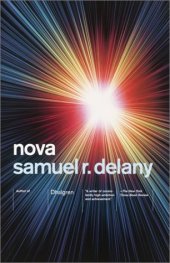Delany has become one of my favourite science fiction authors and I’ve wanted to re-read Nova for quite some time. I didn’t fully enjoy it when I was younger, but I’ve recently been re-sampling his oeuvre and a few of his books that had left me cold when I younger are remarkable, intellectual gems; in particular, Stars in My Pocket Like Grains of Sand (IMHO his SF masterpiece) and Dhalgren (a compelling book that defies categorization and requires a tolerant, tenacious reader).
In Nova, Delany imagines intriguing forms of sensual stimulation: futuristic drugs, music and art, electronic-cyborg-sensations via jacking into computers, and the sensory syrynx. Early in the novel, the syrynx is referred to as an ax, inviting the notion of more than one use: certainly as an innovative, futuristic musical instrument, but also, potentially, as a weapon. The syrynx — an allusion to Pan’s pipe and possibly a syringe — can create music, scents and images.
In the opening scene of the novel a character explains how he became overdosed on sensory input while plugged-into to a spaceship’s computer, perceiving a nova at close-range. An input-overload left his senses permanently disabled:
“We were moving out, boy, with the three hundred suns of the Pleiades glittering like a puddle of jewelled milk on our left, and all blackness wrapped around our right. The ship was me; I was the ship… … It was like the universe was torn and all day raging through. I wouldn’t go off sensory input. I wouldn’t look away. All the colours you could think of were there, blotting the night. And finally the shock waves; the walls sang. Magnetic inductance oscillated over our ship, nearly rattled us apart… … then it was too late.” [p. 2]
Nova is a short novel, but it is filled with subtle depth. Delany does an admirable job of assembling his universe with judicious measures of information on the economy, the arts, fashion, politics, and the ever-changing mosaic of human society. Mythic stories and characters resound ambiguously throughout the novel, unifying the whole. The novel’s characters are ciphers of mythical personalities (Jason, the Fisher King, Prometheus, Pan …) and the plot sails on the seas of allegory (the Holy Grail, the Golden Fleece and the prognostications of the Tarot, to name a few). Individuals are nodes in the galactic web of humanity: their myths and tales are like the warp and weave that connects undulating nodes of a net in the ocean.
The novel’s characters have varied upbringings, allowing a comprehensive view of Delany’s future society. Lorq Von Ray is a rich man from the Pleiades (economic and political rival to the Earth worlds), Katin is an educated, middle-class man (raised on Earth’s moon), and the Mouse (who plays the syrynx) is a poor gypsy from Earth. There are also minor characters, some of whom come from the outer worlds with differing economic and political agendas. And there is a villain, the Prince, from Draco (the Earth-based systems). It is a male-dominated novel: there are interesting female characters (Lorq’s aunt Celia, crewmember and Tarot card-reader Tyÿ, and Prince’s sister Ruby Red), but they are overshadowed by the main male characters, and perhaps this is an unfortunate sign of the times.
Within the book, one character, Katin, wants to write a novel — an archaic art-form — and the book the reader holds, Nova, is presented as his attempt. ‘Nova’ and ‘novel’ share the same root, the Greek word novum, something new. My nova-knowledge is woefully slim, but in the context of the book, a nova not only shatters the laws of physics, but is also capable of providing the material required to shatter the balance of political and economic power; further, it can shatter the psyche.
Nova is a revenge story, a quest story, a space-opera, a story that reverberates with myth, and an economic/political story. It is intelligent and has a heart larger than its parts. It is a good starting point if you are new to the author: perhaps the best, and most accessible, of his early novels (Triton would also be a good place to begin, although the main character is quite repugnant).
I truly appreciate Samuel R. Delany’s fiction; in particular, The Einstein Intersection (1967), Nova (1968), Dhalgren (1975), Stars in My Pocket Like Grains of Sand (1984), and the Nevèrÿon series (1979-1987).
I wish he would write more science fiction; if nothing else, perhaps he could write The Splendor and Misery of Bodies, of Cities, the intended-but-unwritten sequel to Stars in My Pocket, Like Grains of Sand. His justification for not completing the diptych is scrupulous and, even without the sequel, the first book stands sufficiently on its own. Nevertheless….
